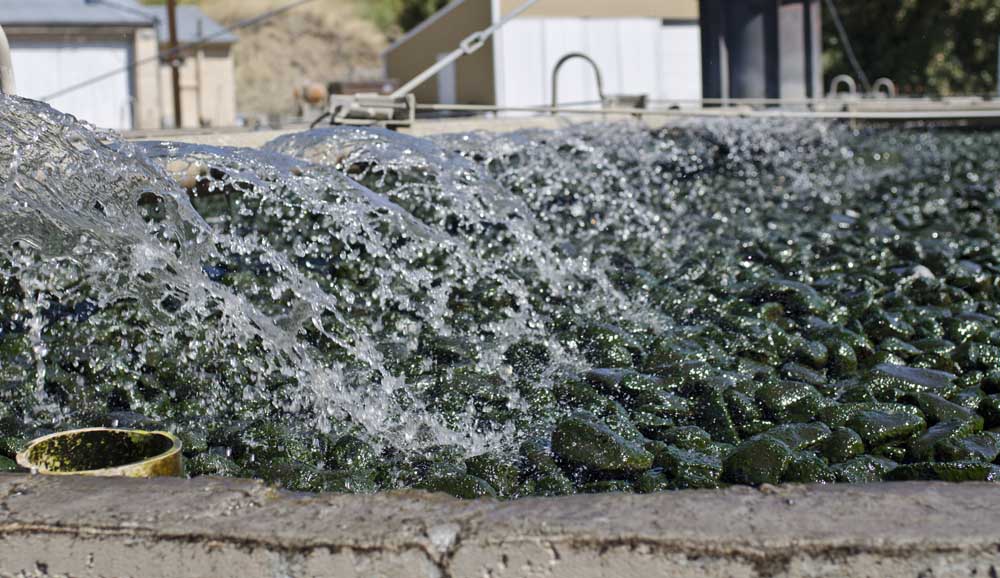No headline.
Published 3:41 pm Tuesday, August 30, 2016

- Water circulates through one of the last stages of treatment, a trickle filter, on Friday, Aug. 26.
City manager proposes progressive solution to wastewater problem
By Rylan Boggs
Blue Mountain Eagle
John Day City Manager Nick Green has proposed an innovative solution to upgrading the city’s out-of-date wastewater treatment plant.
Green has proposed a hydroponic treatment plant that would use reclaimed wastewater to help grow cash crops to offset the cost of the facility.
Hydroponic waste water plants are currently in use in Europe and the United States. The Waterhub system in Atlanta, Georgia, is the first in the nation and uses hydroponically grown plants to recycle up to 400,000 gallons of water a day.
Built by the company Sustainable Water, this type of plant could be scaled to fit the needs of John Day, Green said. If the plant were to become a reality, it would be the second of its kind in the country.
The system involves growing vegetation over a series of bioreactors so roots hang into the reactors providing a habitat for microbial organisms that consume organic waste.
The plants grown could be any number of cash crops including bamboo, flowers, lavender, ornamental grasses and medicinal herbs that could be regularly harvested and sold to offset the cost of the facility.
Additionally, reclaimed water from the plant could be used for irrigation, landscaping and utility operations.
The current mechanical treatment plant on Northwest Seventh Street was built in 1949 and last updated in 1978. The plant is currently under administrative review from the Oregon Department of Environmental Quality.
“Because of our proximity to the (John Day) river, our current facility will most likely not meet the more stringent permitting requirements,” Green said, describing the facility as “very, very overdue” for an update.
The hydroponic plant from Sustainable Water could be funded in one of two ways. The city could privatize wastewater management by allowing Sustainable Water to build, operate and maintain a facility like Waterhub and pay off the cost of the facility over a 40-year period, while purchasing reclaimed water at an agreed upon price. Or, the city could petition the state for financing and create a similar facility by paying the cost upfront and owning its own wastewater facility.
Green said the city is evaluating both courses of action. A new plant is estimated to cost between 8-12 million dollars.
Sustainable Water would require a water purchase agreement to build a plant — “a financing vehicle that allows Sustainable Water to fully construct and operate water reclamation systems at no capital expense or development risk to the end user,” Sustainable Water’s website states.
The current plant processes roughly 200,000 gallons of waste a day and is outdated. Fluid leaks from the sides of old concrete tanks, and employees must remove solid garbage manually by using rakes.
“When people ask, ‘Why are we making this investment?’ I want to bring them out here with rakes and have them pull garbage out of the headworks,” he said. “Because that’s what these (city public works) guys are doing.”
Oren Wyss is the treatment plant operator and one the people charged with using the rakes. Wyss said the biggest problem with the facility is the quality of the treatment.
“It doesn’t take out nitrites. It doesn’t take out nitrates. Phosphorous removal is pretty much none and those are the three main things why we can’t discharge into the river,” Wyss said.
“This is World War II-era technology, that is Vietnam-era technology,” Green said, gesturing around to various parts of the plant. “We’re wanting next-gen technology.”






